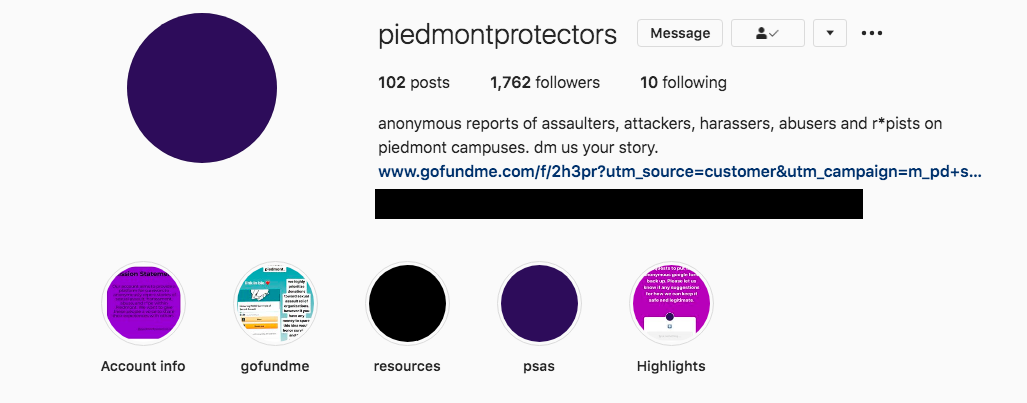In less than a month, the anonymous Instagram account @piedmontprotectors has featured almost one hundred stories from teens and young adults of sexual harassment and sexual assault in Piedmont, roiling the community and prompting a response from educators this summer.
The posts document a wide range of stories from slut shaming to rape. Stories are sent by direct message to the account and are anonymously shared by the teen administrators on the platform. Piedmont Protector’s mission, according to the site admins, is to “provide a platform for survivors to anonymously report stories of sexual assault, harrassment, abuse, and rape within Piedmont. We want to give these people a voice to share their experiences.”
The Exedra spoke to the administrators of the account via a group video chat. (They kept their video turned off to protect their identities.) The admins say they were inspired by other Instagram accounts like Berkeley High School’s Berkeley Protectors and chose to create one because they felt like the school district doesn’t adequately address the topic of consent, noting that the Consent Assembly presented once a year for freshman and seniors, isn’t enough. “The Assembly is given only [twice in four years] and is easy to ignore. Social media is a more powerful tool because teens are looking at it everyday,” said a site admin.
The social media strategy seems to be effective. One site admin said, “People have reached out to the account saying ‘I knew that people got assaulted at Piedmont, but I didn’t know it was this bad.’”
The community response to the account has been mixed. The administrators of the account have been threatened with two lawsuits for a since deleted post that included the names of accused perpetrators. Friends of the accused have also threatened the site admins online. Some question the site admins’ decision to stay anonymous. However concealing their identities gives the administrators protection, they say, and, despite the backlash, they feel launching the account has been worth it.
“People who see the stories feel that their experiences are validated and that the sexual harassment and sexual assault is happening to all of us,” said one site admin. Another spoke of the rewards of their effort. “Just hearing the relief from survivors that they have somewhere to share their stories. The gratitude means a lot, especially with the people threatening them.”
Some teens and young adults DM (“direct message”) their stories to the Instagram account without the intent of their stories being shared. “The account gets to be a safe space to share regardless of whether survivors want their story to be shared or not,” said an account administrator.
The site admins hope to see a change in Piedmont culture and PUSD consent education. “We would like to see more education on consent. Education on consent should start earlier and be continuous.” They highlighted a Piedmont Recreation Department program on Healthy Relationships led by Natasha Singh for middle schoolers as an example.
Singh has been holding classes for middle schoolers for six years, helping young teens — boys in particular — learn how to identify sexual harassment, learn to hold themselves and others accountable, and to critically think about pornography, and more.
“If people are using social media, I am imagining it is because other pathways aren’t accessible and easy to use,” Singh said when I reached out to her about Piedmont Protectors account.
“It’s important to remember that what is happening in Piedmont is similar to what’s happening across the country in regard to sexual assault and sexual harassment,” she said. “People who have been victimized don’t feel like they have much recourse, they second-guess themselves. Perpetration by the same person or same group of people is also sadly very commonplace.”
“I want to reiterate and honor the bravery and the courage of the young people coming forward to not only shine a light on their experiences but to invite and call other people in to advocate for change and transform the community. Reading through the stories it is clear students felt emboldened by other people breaking the silence,” she said.
(Editor’s note: An earlier version of this story said Singh had been teaching her classes “for a couple of years” instead of six years.)
